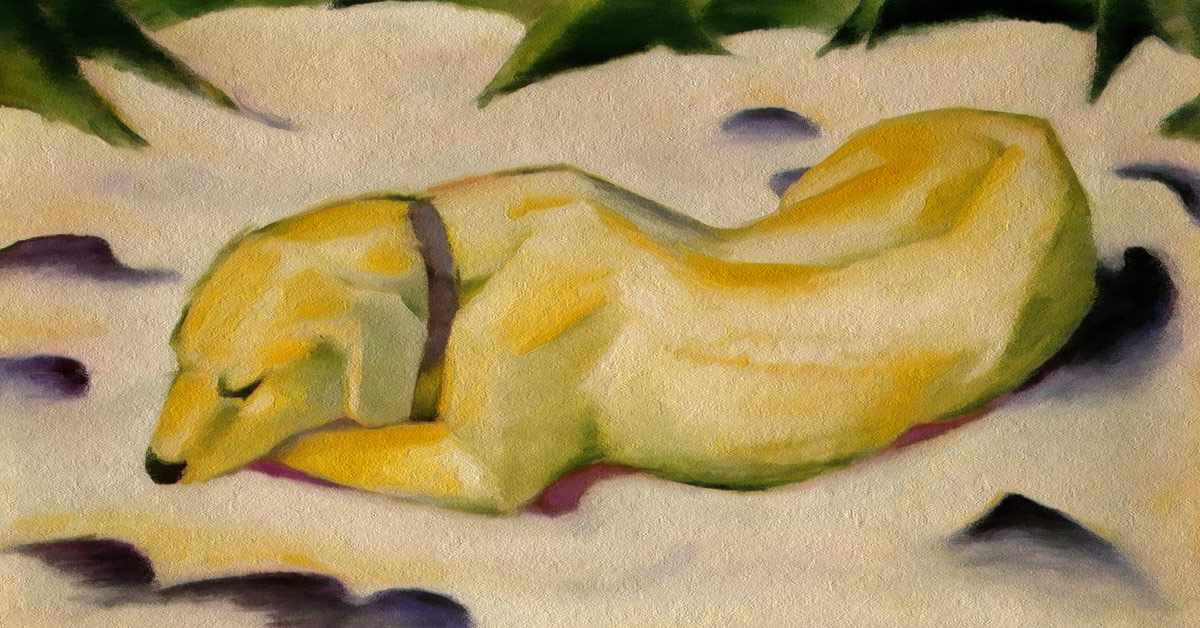We run our website the way we wished the whole internet worked: we provide high quality original content with no ads. We are funded solely by your direct support. Please consider supporting this project.

To Bleed or Not to Bleed: Reflections on Animal Sacrifices
Article by Jesse Birkey
Is God good or not?
“Hey, make sure you don’t let the dog out tonight.” My father started out the door but threw one final look at me. “Or if you do, stay out with him to make sure he doesn’t run off.”
I glanced up from my Whole 30 approved lunch of chocolate cake with chocolate frosting too late to catch anything but the empty space he’d filled a moment before. “Hang on,” I called running after him. “Why are you worried about Max?”
I reached him as he slid behind the wheel of his old Corolla. Reliable but plain. Basic. No frills. Vanilla – Just like his favorite ice cream.
“There have been some reports of pets missing in the area and I don’t want Max to be one of them.”
I scrunched my face. “What do you mean, ‘missing’?”
“I mean that people take them for sacrifices,” he said. “Reportedly.”
I squinted through the bright sunlight. “Well, that’s gross. And terrible. Who does that?”
Dad pulled the door halfway closed. “Some people do. Especially on Halloween.”
I shivered as a cold thought pricked me. “I’m going trick-or-treating tonight. Aren’t you worried about me?”
“Naw,” he smirked. “10 minutes with you and they’d turn themselves in.”
My glare only fueled his laughter as he sped off in a cloud of dust.
Is God good or not?
I remember the emotions that gripped me when I realized that animal sacrifice existed, not just around the area I grew up, but in the world at large – disgust, anger, fear, and an acute sense of wrong. As if the broadly accepted view of morality had been violated. It’s wrong to sacrifice your neighbor’s Labradoodle, even the one that won’t shut up at 11 PM. Most people would acknowledge that. The exception might be your average sociopath.
Imagine justifying it by saying you slaughtered the Doodle because you’d stolen money from the drawer at work and needed to appease your god with the sweet aroma of dead dog. That’s the kind of explanation rewarded with an involuntary 72-hour hold in the psych ward.
What kind of thoughts or images run through your brain when somebody brings up animal sacrifice? I immediately think of a Temple-of-Doom environment. Dark. Ugly. Crazy. Evil. And the people who perform these sacrifices? Evil, along with their demon gods who demand it. Like witches on Halloween.
Oh, but everything changes when we discuss animal sacrifice within the context of God and the Old Testament. Suddenly the entire thing becomes light instead of dark. Sane not crazy. Good and not evil. Necessary and beautiful instead of pointless and ugly.
How can this be? My brain used to get very dizzy from all the mental gymnastics needed to get around the issue. In the end I’d just stop thinking about it.
But the problem of animal sacrifice fades against the much bigger question it leads to: “What does it have to say about the character and nature of the one ordering it?” Isn’t it reasonable to assume that an immoral act would be ordered by an immoral source?
A wrathful deity that demands blood doesn’t seem beautiful. It’s hard to suggest a deity like that could even be good. So, then, the question becomes, “Is God really like that?” But what if he isn’t? What if there’s been a misunderstanding?
I think most would agree that separating humanity from God sits near the top of Satan’s to-do list. It might surprise you that his strategy for accomplishing that goal hides in plain sight within the opening chapters of Genesis.
In Genesis 3:1, we find the first mention of the serpent and its first recorded words, “Did God really say?” In verse 4 the serpent goes on to state that God didn’t want the fruit to be eaten because it would make Adam and Eve just like God. His equal.
It took just two passages for the enemy to successfully assault two critical systems: humanity’s ability to understand God, and the very character and nature of the Father himself. If our adversary can undermine the character and nature of God so much so that we run from him instead of to him, he has successfully enslaved us. The lies about the character and nature of God are the very works of the devil that Jesus came to destroy.
We need to untangle every lie that distorts the character and nature of God because each one damages our ability to relate to him. To desire him. Fortunately, we have a key, a cipher to help us understand the true character and nature of God.
The writer of Hebrews tells us in chapter 1 that Jesus stands alone as the only complete and perfect representation of the Father. He is the essence of God’s glory and the very image of his likeness. If that’s true, it would be reasonable to assume we’d find evidence that God is moved by blood in the life and ministry of Jesus. But we don’t. In fact, three stories in Luke 5 undermine the belief that animal blood moves the heart of God at all. I hope these stories will help you find the arms of a God more beautiful than you thought possible.
Jesus heals the Leper (Luke 5:12-14)
Two things are of note in this passage. First, Jesus healed the man without any sacrifice or offering being presented. Ancient Judaism claimed that God punished individual and communal sin with sickness or disease (we see some of this in John 9 when Jesus’ disciples ask him who sinned that the man was born blind). It claimed that healing came through forgiveness and forgiveness only through sacrifice. But Jesus healed the leper without requiring any of that, which totally undermined the long-standing doctrine. Compassion and self-sacrificial love moved Jesus, not blood and the aroma of roasted meat.
Second, Jesus healed the man and told him to make an offering. He said, “…make an offering for your healing, just as Moses commanded.” (my emphasis added)
Many passages in the New Testament elevate the authority of Jesus above the Law and Prophets. Examples of that include Jesus’ baptism, transfiguration and even his own words establishing himself as a superior revelation (“You have heard it said…but I say to you,” passages) but in the command to the healed leper Jesus leaves out any mention of Yahweh or himself. It seems that Jesus could have easily said, “just as Yahweh commanded” or “Just as I command you” or “As God commanded you through Moses” or even simply “Go make an offering for your healing.” Instead, he credits the offering structure to Moses, a man. This implies that men constructed the entire sacrificial system and God only acquiesced to the desire of the people.
Jesus heals the paraplegic (Luke 5:20-25)
In this passage, similar to the first, Jesus heals the man without sacrifice or even a process of repentance. But what he did next blew my mind.
Jesus says in verse 20, “My friend, your sins are forgiven!” That’s it. It took just a few words for Jesus to cleanse him with the waters of love itself. A goat didn’t have to bleed before the man could be set free.
Put yourself in the mind of the religious leader who’d worked to establish himself as the ultimate authority on the law. Who taught that the only way to experience forgiveness and restored standing with God was to shed blood. And here comes a man who, in an instant, destroys the doctrine you spent your whole life defending. Not only that, but as a crowd of lay-people witness, the lame man gets up healed, proving that Jesus has the kind of power and authority capable of unraveling everything you spent your life building. No wonder they killed him.
Jesus admonishes the religious leaders (Luke 5:36-39)
Jesus wraps up this encounter with the religious leaders in a profound and perfect way. It’s the analogy of old and new wineskins with old and new wine. The last sentence is an incredible knock-out punch to an infuriated crowd.
Jesus says to them in verse 39, “Yet you say, ‘the old ways are better’, and you refuse to even taste the new wine that I bring.”
Isn’t this the struggle of so many of us? Each of us have grown up influenced by a plethora of authorities including ministry leaders, theologians, family, and even life itself. Each of these have sown seeds into the soil of our hearts giving birth to deep conviction. But sometimes powerful conviction becomes our identity. It’s almost impossible to separate what we believe from who we are.
When belief becomes identity, any challenge feels like a threat to our very lives. In that state, we act just like the religious leaders who would rather hold on to the image of a blood-thirsty, wrath-filled deity than embrace the beauty of Jesus moved by love. We grip white-knuckled to the ugly instead of drinking a cup filled with uncomfortable beauty.
The result is an arms-length relationship with the Father, and our adversary’s strategy of undermining the true character and nature of God advances. Jesus came to destroy the works of the devil that we might run to him instead of away from him. He came to reveal the truth that God never asked for or needed the blood of animals in order to restore us to himself. He came to show us that we could never experience or begin to imagine anything more beautiful and glorious than the Father.
Chewing on this should lead to more questions surrounding passages that seem to support animal sacrifice as a God-originated plan. I encourage you to read other incredible resources here on reknew.org dealing with these questions such as:
Why did God require animal sacrifice in the Old Testament?
Did God will animal sacrifices?
My intent is to make sure that when dealing with questions rooted in the character and nature of God, we view those questions through the lens of Jesus. Unimaginable beauty lies within.
Is God good? Yes, and he’s better than you think.
Category: General, Guest Contributor
Guest Contributor:

Jesse Birkey lives with his wife and 2 kids in Tampa, Florida where he works as a Lieutenant for the fire department. Jesse has authored five books including Life Resurrected and Finding Home. He has also appeared in the ground-breaking documentary, DeadRaiser and Destination America’s, Project Afterlife.
